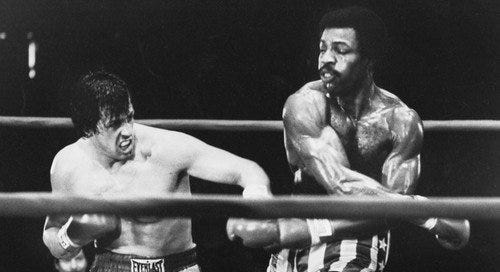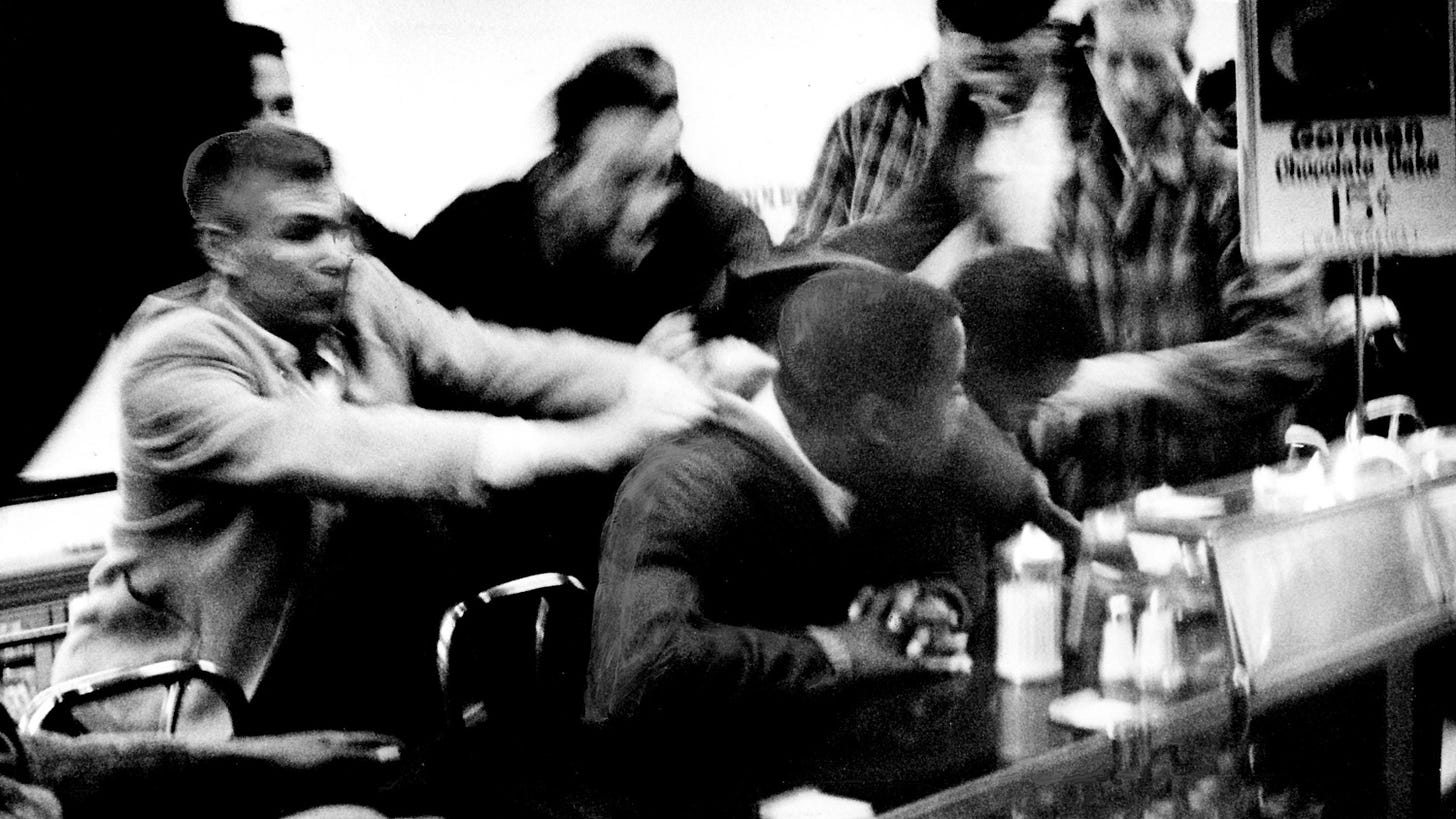Dave Smith debates have become libertarian spectacles like professional combat sports, complete with pay-per-view live access to the Lions of Liberty feed, play-by-play breakdowns and hype for weeks in advance.
So far, Dave has bested a scholar from the Cato Institute, a socialist professor and the head of the libertarian party. Each has entered the intellectual ring with Dave, and each has left humiliated.
The most recent challenger to go toe-to-toe with Dave was the little-known Chair of the Vermont Libertarian Party, Archie Flower. Twitter followers is a crude measure of intellectual prowess, but at the time of writing, Dave Smith has 86,000 Twitter followers, a popular podcast, a successful comedy special and multiple appearances on the most popular podcast in the world. Archie has 600 followers.
It was Apollo Creed vs Rocky Balboa. Maybe even more lopsided.
This should have been the easiest fight in Dave’s career. I tuned in, expecting a slaughter. What I got surprised me.
The universal verdict was that Dave won. He was clearly a more practiced communicator. His arguments were more coherent and polished and he skillfully handled every point Archie made.
Archie, on the other hand, struggled to make his point clear. The resolution was this: “racism inherently violates the non-aggression principle.” Archie lost the debate with his first sentence in his opening statement, which was, “There is no such thing as thought crime.” He then went on to state that racism is a spectrum and that he was only talking about the more extreme form of racism. Dave and Marc were both gracious and fair. But it was impossible not to lose after Archie gave up so much ground in his opening statement.
And let’s face it, Archie lost the debate largely because he was wrong. On the narrow point of the debate, Dave was correct. Thinking bad thoughts (even racist thoughts) does not violate the Non-Aggression Principle. Even the worst forms of racism do not violate the NAP without accompanying violent, destructive or fraudulent action.
Archie Flower, like all the challengers before him, lost soundly. But in losing, Archie managed to do something even more impressive than win a debate. He managed to present an original, thought-provoking and substantial idea. He changed the way that I look at the NAP and its relationship to racism forever.
If you didn’t follow Archie’s argument, I don’t blame you. I spoke with him after the debate and he admits he was disappointed that he wasn’t clearer. His presentation was far from polished. But once you look past his awkward delivery, you actually find an elegantly logical idea with profound implications.
With the benefit of hindsight and without the pressure of a live debate, let me try to restate his argument here.
Libertarians generally agree on the definition of the Non-Aggression Principle. Murray Rothbard defined the NAP this way:
“The fundamental axiom of libertarian theory is that no one may threaten or commit violence (“aggress”) against another man’s person or property. Violence may be employed only against the man who commits such violence; that is, only defensively against the aggressive violence of another.”
Archie’s point is that the NAP is susceptible to corruption and perversion. One dangerous way to distort the NAP is to change the definition of the words contained in the definition of the NAP.
This is a simple but powerful insight.
For example, many self-proclaimed “libertarian socialists” profess to believe in the Non-Aggression Principle. But the NAP they adhere to is perverted by their incorrect definition of the word “property.” They twist the word to mean only items that are actively being used by the owner. That is how they justify statements like “rent is theft.” According to their corrupted definition of property, once you no longer live in a house you built, you no longer own that house. So charging rent for someone else to live in the house you built is theft.
You can see how this change to a single word contained in the definition of the Non-Aggression Principle completely distorts its meaning. It perverts the NAP and turns it into something completely different. And something fundamentally unjust.
Libertarians should be actively combatting any efforts to change the definition of property. Anyone who asserts that private ownership of factories is illegitimate is perverting the Non Aggression Principle and twisting it to justify aggressive, unlibertarian actions like violently seizing the means of production.
Archie’s elegant line of reasoning is this: If the meaning of the NAP is susceptible to being perverted by changing the definition of property, it is also susceptible to perversion by changing the definition of the word “person.” Racism has the potential to pervert the Non-Aggression Principle and change it to something anti-libertarian by changing the definition of personhood.
Not only is this train of thought logically valid, it also has profound implications for libertarians. If we believe it is important for libertarians to protect the definition of words like “property” in order to protect the coherence and moral relevance of the Non-Aggression Principle, it is every bit as important to protect the meaning of the word “person.” More important, in fact.
Archie proved with facts and logic that it is not enough for libertarians to be passively non-racist. We must be actively anti-racist. (Sorry. Could’t help myself.) Why? Because racism has the potential to distort our philosophy in an unacceptable fashion; the same way socialist definitions of property distort the Non-Aggression Principle.
(I feel compelled to note here that my use of the term “anti-racist” does not mean the same thing that racial justice advocates mean when they use the term. Prominent leftists like Ibram X. Kendi use the term “anti-racist” to justify treating racial groups differently in order to make the races more economically equal. This is, in fact, another form of racism and is every bit as incompatible with libertarianism as right-wing racism.)
Other great libertarians have argued that libertarianism is inherently anti-racist. I’m reminded of this article by the great libertarian writer, Sheldon Richman. https://fee.org/articles/libertarianism-anti-racism/
Richman argues that even non-violent racism is anti-libertarian for two reasons. First, because it is collectivist. Racism offends the individualist sentiments of libertarians and our sense of justice. The second reason is that non-violent racism often leads to violent racism. So libertarians should resist racism before it becomes violent.
Richman’s points are important and compelling. But Archie’s point is even more elegant and persuasive. He is saying that racism, even racism that is non-violent, cannot be tolerated within libertarianism because it undermines our whole philosophy. It has the potential to redefine personhood, which has the potential to destroy the moral relevance of the NAP.
Before listening to the debate, I believed that racism was irrational and abhorrent. But I did not believe it was anti-libertarian unless it was violent. I believed my condemnation of racism was disconnected to libertarianism. Archie Flower changed my mind about that. He made me realize that libertarianism and racism are wholly incompatible. Because once we allow racism into libertarianism, it fundamentally changes what libertarianism means.





Wow, this was really very good. Subscribed, and thank you for writing this.
Honestly, if we think of Racism as just another meme, or memetic bit that floats through a population, OF COURSE it threatens the NAP since it attacks one of its' fundamental premises.
Kind of a "duh" moment.
More great writing, thanks!